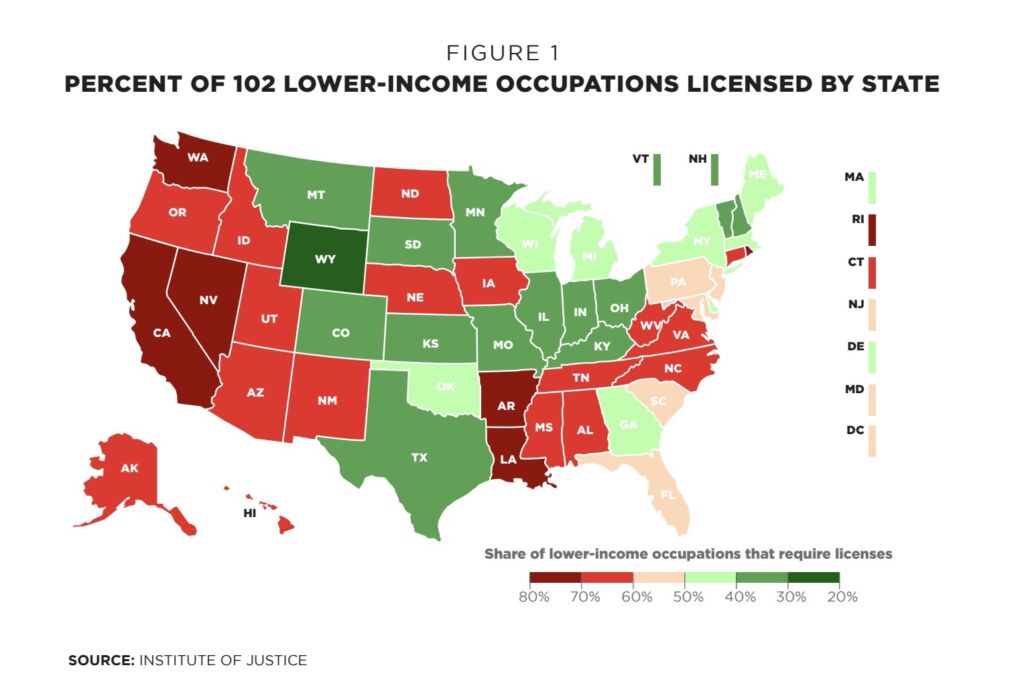How to reform occupational licensing laws in Minnesota
Approximately one in every five Minnesotans has an occupation that requires a license. According to a 2017 report by the Institute of Justice (IJ), Minnesotans spend on average $238 in fees, write two exams, and undertake 300 days of training to acquire an occupational license.
Compared to most states, Minnesota ranks well on licensing burden. In 2017, Minnesota only licensed 34 of the 102 (33 percent) lower-income occupations studied by IJ, ranking the 46th most broadly and onerously licensed state.

Minnesota’s licensing burden has, however, been growing faster than that of other states. Additionally, Minnesota requires licenses for occupations that other states do not license so onerously.
For example, Minnesota licenses dental assistants, a requirement in only eight other states. And while dental assistants on average pay $138 in fees, spend 92 days on education and experience, and write one exam, in Minnesota, they pay $681 in fees, spend 425 days on education and training, and write three exams.
This is problematic for our state. Occupational licensing keeps low-income individuals out of lucrative professions, restricts supply and raises prices for goods and services, deters economic mobility, increases income inequality, and reduces geographic mobility. Moreover, there is little evidence to indicate that licensing improves quality or safety.
How to reform
To curb the growing licensing burden and ensure that Minnesotans are not burdened with irrelevant laws, American Experiment recommends that state lawmakers do the following:
Adopt universal licensure recognition
13 states have enacted universal licensure, starting with Arizona in 2019. Since enacting universal recognition, the number of licensed individuals moving to Arizona from other states has risen. At a time when Minnesota is facing massive worker shortages with a labor force evidently smaller than before the pandemic, universal licensure laws could
help attract out-of-state workers to our economy.
Adopt certification, registration, and inspection for low-risk occupations
Currently, there are numerous licensed occupations that would be served by less demanding regulations like certification, registration, and inspection.
In cosmetology, for instance, the biggest concern is sanitation. In that case, inspection would be a more appropriate regulation than licensing. With inspection, consumers can judge quality in the market without the state government placing an undue licensing burden on workers and businesses.
Reinstate the Minnesota Sunset Act
One useful tool that enables states to keep regulatory agencies in check is the use of sunset
laws: statutes that require periodic reviews of agencies to show their continued relevancy. In 2011, the Minnesota Legislature voted to enact the Sunset Act, which created the Sunset Advisory Commission –– a legislative committee responsible for performing such reviews.
The Commission was responsible for reviewing agencies and recommending one of three options:
- Sunsetting an agency if deemed irrelevant or ineffective;
- Continuing the agency, but with change; or
- Continuing the agency unchanged.
Recommended changes to licensing might include providing less restrictive rules like certification or inspection, or aligning licensing rules with those of other states.
Before the Minnesota Sunset Act was repealed in 2013, the Commission reviewed numerous agencies, some of which were abolished or changed by the Legislature on the
Commission’s recommendation. The Commission also recommended that Minnesota join the Nurse Licensure Compact to reduce redundancy.
The Legislature should consider reenacting the Sunset Act, specifically to keep licensing boards in-check and ensure that Minnesota is not fraught with the irrelevant and overly burdensome licensing rules currently in place.
Conclusion
Minnesota’s growing licensing burden is a threat to our labor market and imposes a heavy cost, especially on low-income residents. The Legislature should consider enacting universal licensure recognition, adopting less restrictive rules, and reinstating the Minnesota Sunset Act.
Licensing reform in Minnesota would improve innovation and entrepreneurship, enable low-income Minnesotans to join lucrative, low-risk professions like cosmetology, increase the supply of services, and reduce prices. Additionally, licensing reform would help push more individuals into the workforce from both inside and outside the state, helping to ease workforce shortage issues.